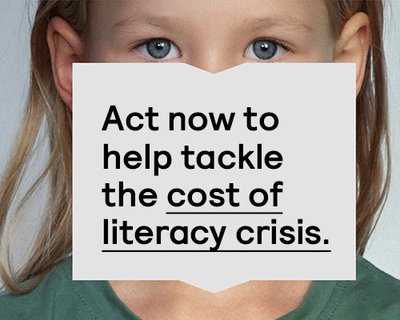Early Words Matter

A child’s earliest years are crucial to their development and life chances.
However, last year over 185,000 5-year-olds started school without the literacy, communication and language skills they needed to thrive. Without this firm foundation not only will their learning, confidence and wellbeing suffer in their early school days, but they are much more likely to struggle with their GCSEs and be unemployed by their 30s.
Children experiencing poverty are most likely to be affected.
Where you are born and how wealthy your family is often determines where you end up.
Families experiencing poverty are less likely to have the resources, information and confidence to create the stimulating and engaging environment needed to develop crucial early communication, language and literacy skills. Lower income parents may be less confident in their own literacy skills and struggle more with competing time pressures, among other factors.
Low literacy has lifelong consequences
Research by Pro Bono Economics (PBE), which was commissioned by KPMG UK in collaboration with the National Literacy Trust, identified around 106,000 five-year-olds in England in a single year group who did not meet the expected level of literacy, but could reasonably have achieved the expected standard if provided with the right support early on.
-
43,000 children
That's two-fifths of these 106,000 children identified, live in deprived areas. The number is expected to have grown as a result of the pandemic’s closure of early years settings, and subsequent cost of living crisis.
-
Economic costs of around £830 million over their lifetime
The Pro Bono Economics (PBE) report found that insufficient literacy skills support for the 106,000 five-year-olds will generate economic costs of around £830million over their lifetimes, or £7,800 per child on average.
-
Birmingham, Liverpool and Manchester
The economic costs were found to be particularly high in certain areas of England with greater levels of deprivation, such as Birmingham, Liverpool and Manchester, where more than a quarter of five-year-olds have low levels of literacy.
What is the solution?
There is no ‘silver bullet’ solution. Here at the National Literacy Trust we know that we must work together to solve this language and literacy challenge. We are calling on stakeholders from across the business community and all political and professional backgrounds to commit to working together to provide better early years support for families in disadvantaged communities and to drive evidence-based change.
Open letter from business leaders to business leaders
Businesses have a unique role to play. Members from the National Literacy Trust’s national Business Council, made up of senior leaders from businesses as diverse as KPMG, Greggs, WHSmith, British Land, and Very Group, have added their signatures to endorse our Early Words Matter campaign, and take practical action.
They are committed to putting early language and communication at the heart of a national conversation, as well as supporting their staff and customers with the tools to drive change.
Together, we can empower families with more opportunities and early advice to support their child’s development in those crucial first years.
Email us partnerships@literacytrust.org.uk to find out how you and your business can be part of making a difference.

Early Words Matter’s mission is to change this story
Our pioneering, five-year campaign to support 250,000 children will include flagship programmes and local community outreach in areas worst hit by poverty and the cost-of-living crisis.
-
Raise awareness
Early Words Matter will raise awareness of the critical role that the early years play in a child's future social mobility.
-
Deliver practical support
Early Words Matter will deliver practical programmes, resources and training for the early years sector reaching directly into the community through local organisations, businesses, and community leaders.
-
Empower parents
Early Words Matter and its network of partners, programmes and training will empower parents with the resources they need to support their child’s early development at home.
-
Call on the Government
We are calling for the Government to invest in high-quality early childhood education, and prioritise joining up our early education, family support, health services, and community and voluntary organisations to create an integrated early years system that offers consistent support from birth to school.
Help us tackle the cost of literacy crisis…
The soaring cost of living is having a direct impact on child literacy – and the UK’s poorest families are being hit hardest.
A regular donation from you means we could expand our programmes to change more stories. Because where you are born and how wealthy your parents are shouldn’t determine where you end up.

 Donate today to help us tackle the cost of literacy crisis
Donate today to help us tackle the cost of literacy crisis